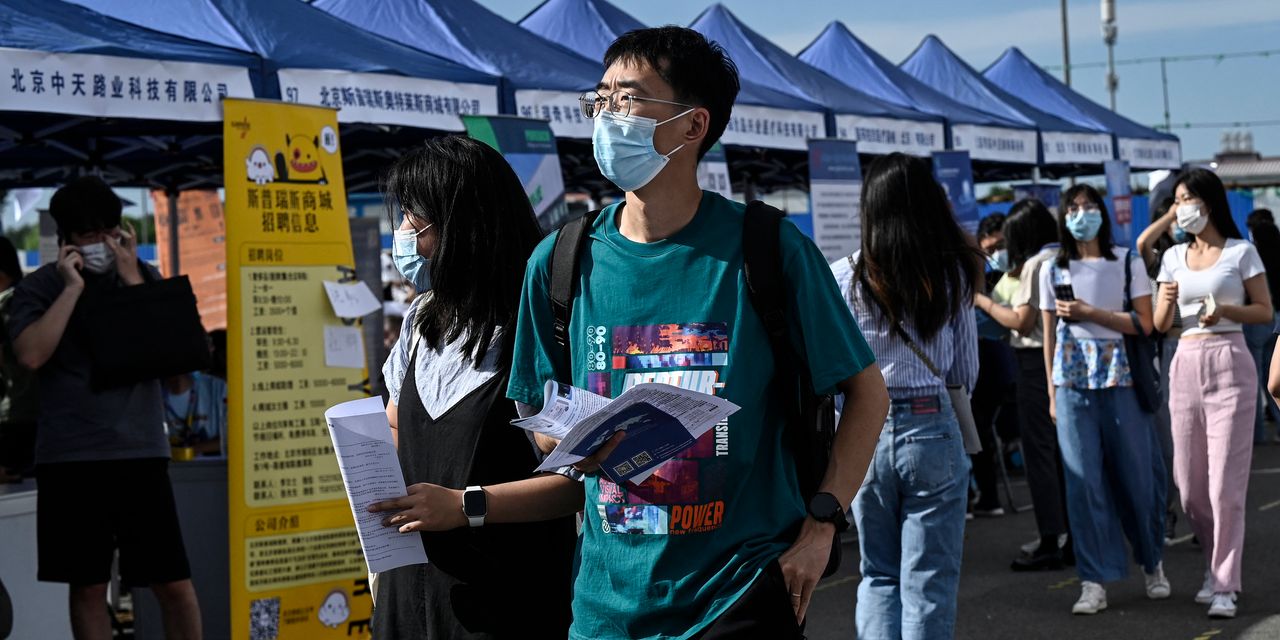China’s record-breaking youth unemployment rate is grabbing significant attention, and understandably so. The jobless rate for Chinese aged 16 to 24 rose to 20.4% in April, officials announced last week.
That means that 1 in 5 of these 170 million young Chinese attempting to kick-start their careers simply can’t find work. For perspective, the ratio in Europe was 14.3% in March, while the U.S. was at 6.5% in April.
Worries abound in China, from the government to universities to families, most of which have only one offspring. That concern may not be translating into helpful solutions, experts said. Government policies are too small or mis-targeted. Universities are adapting too slowly. Even China’s longstanding emphasis on high education may actually be backfiring: a glut of advanced degrees in China has eroded their value.
But things can always get worse. Next month, 11.6 million college students will graduate and leap into this mad scramble.
The causes of this grim marketplace are complex and numerous. China’s draconian lockdowns during Covid didn’t just temporarily disrupt economic activity. Many smaller and private firms, which disproportionately employ younger workers, didn’t have the financial means to survive months of shutdown.
Most economists also predicted China’s post-Covid recovery would be stronger by now. But while the country’s 4.5% GDP growth in the first quarter may be unimpressive by China standards, it isn’t terrible. Neither is the 5.2% overall unemployment rate.
The retail sector is obviously watching nervously. In a report on Monday,
Goldman Sachs Group
warned about the possibility of unemployment persisting in an age group that accounts for 20% of China’s consumption.
The implications extend to China’s wobbly overall economic recovery itself, which has increasingly relied on consumption as factory output, the traditional engine of China’s growth, has stalled. Industrial output grew only 5.6% in April from a year earlier, while retail sales—a gauge of consumption—leapt 18.4%, data released last week show. Neither number met expectations. But China can hardly afford to have a segment of its biggest domestic spenders out of work for extended periods if it hopes for a balanced recovery.
Other culprits for youth joblessness are China’s crackdowns on the tech and education sectors in recent years—areas that are traditional hiring grounds for young talent. Data on employment damage from these regulatory campaigns are hard to come by, but big tech firms lost billions of dollars, and private education companies—after-school tutoring firms, for example—were ordered to become nonprofit or close.
What’s getting less attention is that highly educated youth are struggling more than their lesser educated peers at finding work. The unemployment rate for college graduates is 1.4 times higher than the overall youth rate, according to the Development Research Center at China’s State Council.
Scholars in the U.S. and China investigating youth employment have shed light on this counterintuitive phenomenon.
Graduates, even one with prestigious degrees, simply don’t have the skills that match current openings. So either companies don’t want them or the candidates don’t want the positions. Therefore, when well-educated graduates do accept roles, it’s often the “wrong” work.
One researcher, Li Xiaoguang, an assistant professor at Xi’an Jiaotong University, said it isn’t so much that companies aren’t hiring. Rather, Chinese universities aren’t adequately preparing students for the existing job market.
One result is that graduates are settling for positions they are “over-credentialed” for, many with advanced degrees. The researchers estimate that 24% of graduates fall into this category, which they call a “vertical mismatch.”
Examples of over-education are common in China. Thirty-year-old Louis Yang works on the sales floor of an Apple Store in the city of Chengdu. He has a master’s degree in computer science from a top Australian university. It’s the only offer he got, he told Barron’s by phone.
The researchers found that another third of young Chinese have a “horizontal mismatch”—they accept a position, often out of necessity, that has little relation to what they studied.
Ailin Zhou exemplifies both types of mismatches. She finished her master’s degree in accounting from the United Kingdom three years ago. She now works at a clothing store in a Shanghai mall.
After searching unsuccessfully for positions in her field, she applied on a whim and took the offer. She doesn’t plan to continue looking for accounting roles, she told Barron’s.
Chinese have so aggressively pursued higher education in recent years that advanced degrees have lost value, said Wu Xiaogang, a sociology professor at NYU Shanghai.
This type of “degree inflation” began decades ago in the west. A glut of prestigious or advanced degrees resulted in a watering down such that they no longer resulted in jobs with salaries that justified the educational investment.
In the U.K. and the U.S., market forces intervened, Wu explained. Prospective students noted the diminished value, and many stopped pursuing them or even attending college at all. This shrank the pool of prestigious graduates, and degrees regained value.
The problem is that China doesn’t seem to be responding to its degree inflation. Huge numbers are still seeking advanced degrees in droves. Wu attributes it partially to Chinese culture’s strong emphasis on higher education. “If this mindset doesn’t change, China’s over-education problem will only get worse,” he said.
In addition to being a waste of resources, there may be long-term career implications. Taking a job “beneath” you, or getting stuck in a field that doesn’t match your training, is “highly sticky,” said Li and her research collaborator Yao Lu, a sociology professor at Columbia University.
“This kind of unfavorable work experience sends a negative signal to prospective employers and therefore impedes their future job search,” they told Barron’s in an email. “Unemployment or working in lesser positions also leads to skill deterioration and obsolescence that makes upward mobility difficult.”
Write to [email protected]
Read the full article here




